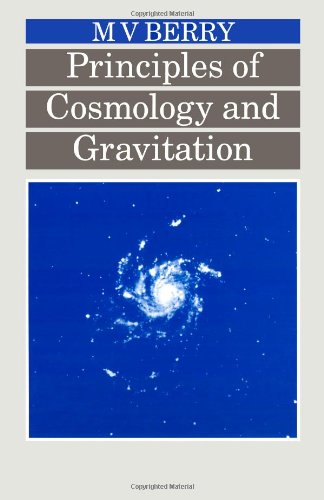Background
The son of a London taxi driver, Berry has a Bachelor of Science in physics from the University of Exeter and a Doctor of Philosophy from the University of Saint Andrews.



(General relativity and quantum mechanics have become the ...)
General relativity and quantum mechanics have become the two central pillars of theoretical physics. Moreover, general relativity has important applications in astrophysics and high-energy particle physics. Covering the fundamentals of the subject, Principles of Cosmology and Gravitation describes the universe as revealed by observations and presents a theoretical framework to enable important cosmological formulae to be derived and numerical calculations performed. Avoiding elaborate formal discussions, the book presents a practical approach that focuses on the general theory of relativity. It examines different evolutionary models and the gravitational effects of massive bodies. The book also includes a large number of worked examples and problems, half with solutions.
http://www.amazon.com/gp/product/0852740379/?tag=2022091-20
mathematician Theoretical physicist university professor
The son of a London taxi driver, Berry has a Bachelor of Science in physics from the University of Exeter and a Doctor of Philosophy from the University of Saint Andrews.
University of Street Andrews.
He was elected a fellow of the Royal Society of London in 1982 and knighted in 1996. From 2006 he has been editor of the journal, Proceedings of the Royal Society. He is known for the Berry phase, a phenomenon observed e.g. in quantum mechanics and optics.
He specialises in semiclassical physics (asymptotic physics, quantum chaos), applied to wave phenomena in quantum mechanics and other areas such as optics.
He is also currently affiliated with the Institute for Quantum Studies at Chapman University in California. Since then, he has spent his whole career at the University of Bristol: research fellow, 1965-1967.
Lecturer, 1967-1974. Reader, 1974-1978. Professor of Physics, 1978-1988.
Royal Society Research Professor since 1988.
Berry has been given the following prizes and awards: Maxwell Medal and Prize, Institute of Physics, 1978 Elected Fellow of the Royal Society of London, 1982 Elected Fellow of the Royal Society of Arts, 1983 Elected Fellow of the Royal Institution, 1983 Elected Member of the Royal Society of Sciences in Uppsala, Sweden, 1986 Bakerian Lecturer, Royal Society, 1987 Elected member of the European Academy, 1989 Dirac Medal and Prize, Institute of Physics, 1990 Lilienfeld Prize, American Physical Society, 1990 Royal Medal, Royal Society, 1990 Naylor Prize and Lectureship in Applied Mathematics, London Mathematical Society, 1992 Foreign Member: United States National Academy of Science, 1995 Dirac Medal, International Centre for Theoretical Physics, 1996 Kapitsa Medal, Russian Academy of Sciences, 1997 Wolf Prize for Physics, Wolf Foundation, Israel, 1998 Honorary Fellow of the Institute of Physics, 1999 Foreign Member: Royal Netherlands Academy of Arts and Sciences, 2000 Ig Nobel Prize for Physics, 2000 (shared with Andre Geim for "The Physics of Flying Frogs") Onsager Medal, Norwegian Technical University, 2001 Gibbs Lecturer, American Mathematical Society, 2002 1st and 3rd prizes, Visions of Science, Novartis/Daily Telegraph, 2002 Elected to Royal Society of Edinburgh 2005 Pólya Prize, London Mathematical Society 2005 Doctor of Science, honoris causa, University of Glasgow 2007 Doctor of Science, honoris causa, Russian-Armenian (Slavonic) University in Yerevan 2012 Lorentz Medal (2014).
(General relativity and quantum mechanics have become the ...)
Royal Society; National Academy of Sciences. Royal Netherlands Academy of Arts and Sciences. Royal Society of Edinburgh.
